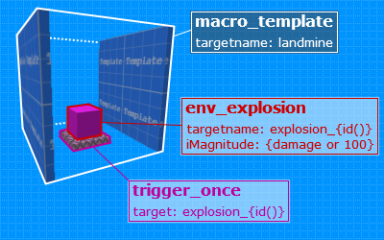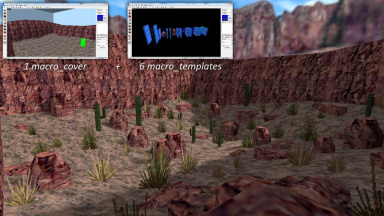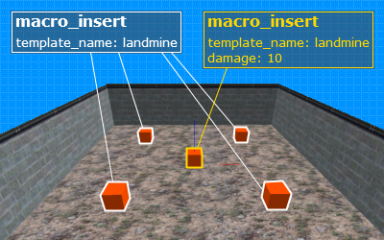Macro Entity Scripting System
Jump to navigation
Jump to search
The Macro Entity Scripting System (MESS) is a tool that helps in automating various tasks in Half-Life level compilation. It offers a templating system and macro entities for creating template instances that can be customized with a basic scripting system. MESS provides entity rewrite rules that allow templates to be used as if they were actual entities.
Features
- Templating System: MESS provides a templating system that allows the creation of templates that can be used in multiple instances. These templates can contain brushes, entities, and other game assets.
- Macro Entities: MESS allows the creation of macro entities that can replicate a complex entity setup as a single entity. It also provides entities that can cover terrain and other surfaces with props. Additionally, using the macro_insert entity, a single brush can be turned into multiple entities.
- Entity Rewrite Rules: MESS provides the ability to modify entity attributes before macro processing occurs by using entity rewrite rules.
- Scripting System: MESS offers a scripting system that allows expressions to be embedded in attribute values, and the customization of templates and instances by referencing attributes of instance-creating entities.
Drawbacks
- Steep Learning Curve: MESS has a steep learning curve due to its complex templating and scripting system. It requires a significant amount of time and effort to learn how to use it correctly.
- Limited Compatibility: MESS is compatible with only Half-Life, which limits its usage in newer games.
- Requires prior knowledge of Hammer Editor: Since MESS is an extension of the Hammer Editor, one needs to have prior knowledge of Hammer to use it efficiently.
Screenshots
Options
-dir directory
- Specifies which directory to use when resolving relative template map paths. By default, the directory where the input map file is located is used. This only applies to relative template paths in the input map file.
-fgd paths
- The .fgd file(s) that contain MESS entity rewrite rules. To provide multiple paths, separate them with a semicolon (path1;path2).
-maxrecursion number
- The maximum recursion depth for templates that insert themselves or other templates. This is a safety mechanism that guards against accidental infinite recursion. The default is 100.
-maxinstances number
- The maximum number of template instances. This is a safety mechanism that guards against accidentally inserting a massive number of instances. The default is 10000.
-log level
- Determines how much information MESS will write to the output:
-off
- Disables almost all logging.
-error
- Only critical errors are shown (problems that cause MESS to abort). This is the default.
-warning
- In addition to critical errors, warnings are also shown (problems that MESS can safely ignore).
-info
- Additional information is shown.
-verbose
- The maximum amount of information is shown.
-repl
- Enables the interactive MScript interpreter mode. This starts a read-evaluate-print loop (REPL), which can be used to test MScript expressions. Do not use this when compiling maps!
External Links
| |||||||||||||||||||||||||||||||||||


